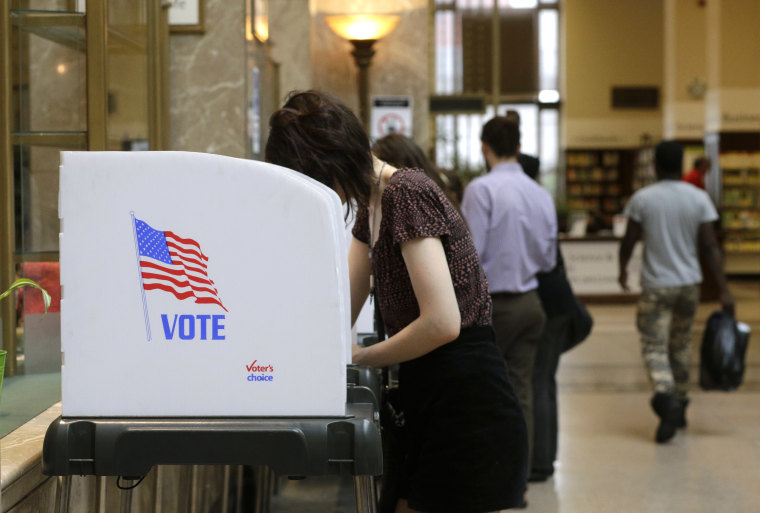Emily’s List passed her up. Democratic Senate Leader Harry Reid chose another candidate to back. But Nevada Democratic congressional candidate Lucy Flores is still considered one of the top three contenders in her race.
Flores' chances improved when Bernie Sanders, for whom she had appeared in a campaign ad, implored his supporters to contribute to her race, bringing in $584,898 for her thus far.
Before his help, Flores was raising little money, a challenge many Latino candidates confront that in turn makes it difficult to attract party backing.
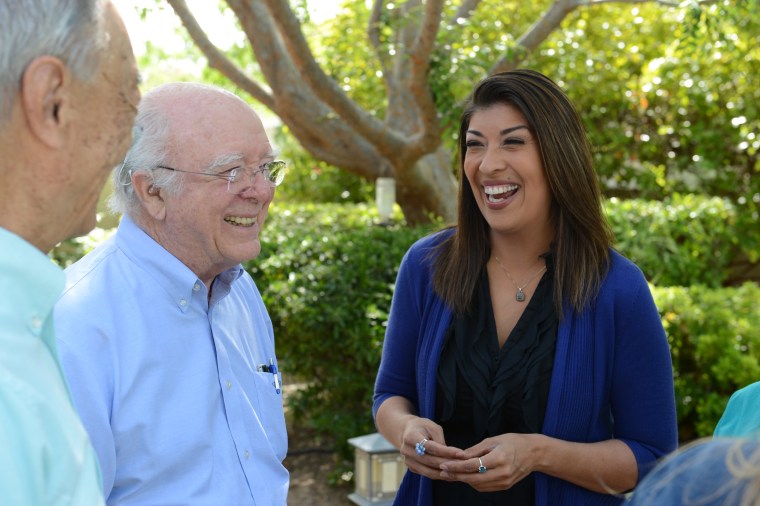
Even though she is acknowledged as the candidate with the best name recognition, Flores said she wasn’t seen as a serious contender until she got Sanders' backing.
“I was not leading in the fundraising. Nowadays, a political commentator doesn’t focus on your record or character. All anyone wants to talk about is money,” she said.
According to Open Secrets, Flores was third among Democrats seeking the seat, with political newcomer Susie Lee in the lead through March 31. Through that time, Lee had raised $1.104 million, followed by former state Rep. Ruben Kihuen, who is also Latino and born in Mexico and raised $726,391, to Flores' $375,542, before Sanders' help. John Oceguera, former Nevada Assembly speaker, followed in fourth with $235,133.
“Having a background like mine and not a network of wealthy donors or wealth myself — and a lot of Latino candidates don’t come from wealth —we are at a disadvantage when we run for office. The fact Bernie ended up choosing me absolutely helped,” Flores said.
Sanders campaign spokeswoman Erika Andiola said that for the Sanders camp "it's just important we have more Latinos who are more progressive ... like Bernie in terms of values."
"We want more and more Latinos to be able to follow that path and have similarities and the values that Bernie has," Andiola said. She said Sanders also is helping down-ballot candidates by energizing the electorate to turn out to vote and support progressive candidates in their districts.
Latinos are 17 percent of the U.S. population and hold about 6,100 Latinos are in elected offices nationwide, according to the bipartisan National Association of Latino Elected and Appointed Officials. There are three in the 50-member U.S. Senate, none who are Latina and in the House 28 of the 435 seats are held by Latinos, nine by Latinas.
Although there are many challenges Latinos face in seeking office, one often mentioned is the difficulty in raising money.
After he received criticism from Hillary Clinton for failing to help other party candidates, Sanders has been picking candidates for whom to help raise money. Flores and a state lawmaker, Joe Salazar have been among the candidates.
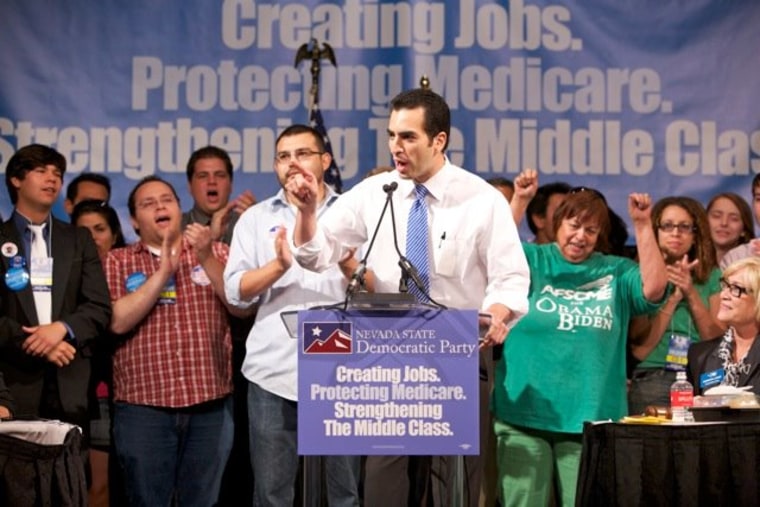
Clinton’s fundraising on behalf of other Democrats dwarf his recent efforts. The millions her campaign has raised have been in conjunction with the Democratic Party and have helped fund the work of state parties.
"Helping Democrats make gains in Congress and statehouses across the country is a top priority for Hillary Clinton, that's why she's focused on raising resources that can be used to organize and turn out Democratic voters who will support candidates up and down the ballot," said Clinton campaign spokesman Jorge Silva. "The coordinated campaigns will ensure our efforts to mobilize millions of voters will help Democrats running at every level."
But even with such fundraising prowess brought by Clinton, Latino and other minority candidates are often dissuaded from seeking office or fail in their attempts because of the daunting chore of raising money in communities with limited resources.
“One of the reasons we launched Latino Victory was because Latino candidates, not only do they have additional barriers to entry, but they also have a challenging time raising money,” said Cristobal Alex, president of Latino Victory Project/Fund. “We don’t yet have the political infrastructure or donor infrastructure. We are working to develop it.”
Related: Latino Victory Project: Making Demographic Destiny a Political Force
Kihuen has earned the backing of the AFL-CIO, the Culinary Union, Reid and other political leaders. He is a superdelegate who has pledged his support to Hillary Clinton and has been endorsed by Bill Clinton.
But Alex said the support for Kihuen isn’t often seen with other Latino candidates who are skipped over by the party or establishment, generally white, party leaders.
Emily’s List, which backs women running for office around the country and who support abortion rights, endorsed Lee, a local philanthropist. Lee’s husband is a CEO of Full House Resorts casino company. In a statement, Emily's List president Stephanie Schriock called Lee an experienced problem solver and powerful advocate for Nevada women and families.
The Flores endorsement is caught up in the politics of the presidential race; with Kihuen being Clinton’s preference, Flores became a Sanders supporter. In his appeal to donors, Sanders told supporters the Emily’s List endorsement went to Lee because Flores backed him, according to Ralston Reports.
Last Friday, Rep. Filemon Vela, D-Texas, blasted the California Democratic Party for backing Kamala Harris in the race to replace Sen. Barbara Boxer, D-Calif. Rep. Loretta Sanchez, D-Calif., also is competing for the spot and has been in second behind Harris, though she is the favorite among may Latino voters.
Vela said in a statement that the party's backing of Harris over Sanchez "is insulting to Latinos all across the country."
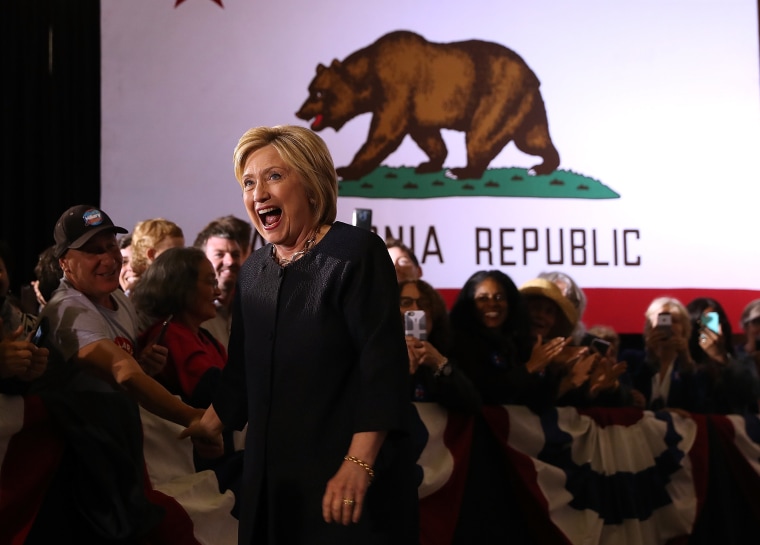
"Not one single Democratic Latina has ever been in the United States Senate, and the California Democratic Party’s position is a disrespectful example of wayward institutional leadership which on the one hand 'wants our vote' but on the other hand wants to 'spit us out,'" Vela stated.
The party said Harris won nearly 71 percent of the backing of the 2,139 state delegates. A majority of the Latino delegates, 56 percent, also backed her, according to an analysis by the Harris campaign.
Related: Latino Groups Question Commitment of Political Donors to Community
Javier Palomarez, president and CEO of the U.S. Hispanic Chamber of Commerce which held candidate forums with Sanders and Clinton and has endorsed Clinton, said the challenges of running for office are amplified and exacerbated for Latino candidates. He said they face a trifecta of being new to the fundraising game, not having a lot of financial support in the Latino community and not getting a lot of backing among the larger white political donor network.
“That’s part of the challenge. Hispanic members are new to the game or newer to the game … their networks are considerably smaller and the range of people they can call on is significantly smaller,” Palomarez said.
Palomarez said Sanders is a “Johnny come lately” to assisting Latino candidates, despite what he has done for Flores. “It’s fairly evident why he is doing it,” said Palomarez, whose chamber has endorsed Clinton.
“Hillary … there’s no question she needs to do better with the Hispanic community, but the reality is she has a long track record, three decades of supporting downstream Hispanic candidates,” said Palomarez.
“There is a connection between the fact the average white family has 10 times as much net worth as Latino and black families and the fact those candidates have trouble raising money." Steve Phillips, author.
Steve Phillips, author of “Brown is the New White: How the Demographic Revolution Has Created a New American Majority," said Sanders' use of his fundraising strength to assist down-ballot candidates “is probably the most revolutionary thing he can do.”
Almost every organization on the left playing in politics, with a large budget, is run by a non-Latino white person, almost exclusively, and that has to change, said Philips.
“There is a connection between the fact the average white family has 10 times as much net worth as Latino and black families and the fact those candidates have trouble raising money,” Phillips said.
What’s different about Sanders is the scale of money he’s been able to move, said Phillips. "That’s the new reality on the political landscape. There’s never been a candidate able to raise the amounts of money in small dollar contributions that Sanders has put together.”
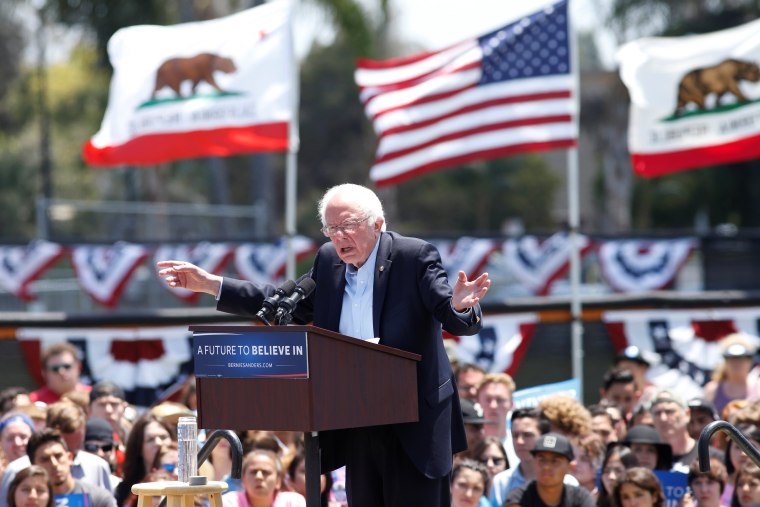
Andrés Ramirez, a political strategist who is president of Ramirez Group in Las Vegas, said Sanders had done little more than return a favor. He thinks ultimately Flores won’t win the race. Kihuen is an employee of Ramirez Group and on leave while he campaigns. Ramirez is a superdelegate who is supporting Clinton.
Most nominees help other candidates, but most of the effort is on competitive races and “you don’t have an overwhelming number of Latinos running in competitive races.”
“Sanders has chosen a very small group of candidates to help and those candidates are all candidates who endorsed him,” Ramirez said. “So it’s not like he’s saying, look there’s this young Latina in CD4 and she could use help and she’s a good story and she needs help so let me go help her. It’s she helped me … so let me go help her.”
If instead Sanders or any candidate found a group of minority or Latino candidates who if they had access to resources would be credible candidates and helped them win those seats, that would be more revolutionary, he said.
Catherine Cortez Masto is running for Senate in Nevada, to replace Reid. She is the best chance for a Latina to win a seat in the U.S. Senate, although Sanchez also has a chance.
“If Bernie did for her (Cortez Masto) what he did for Lucy . . . that for me would be revolutionary,” Ramirez said. “That’s breaking a barrier.”
Forty six percent of Democrats are people of color and that share may increase in the coming year, states Phillips in his book. Yet much of the progressive and Democratic infrastructure is not investing in those communities and leaders, he said.
